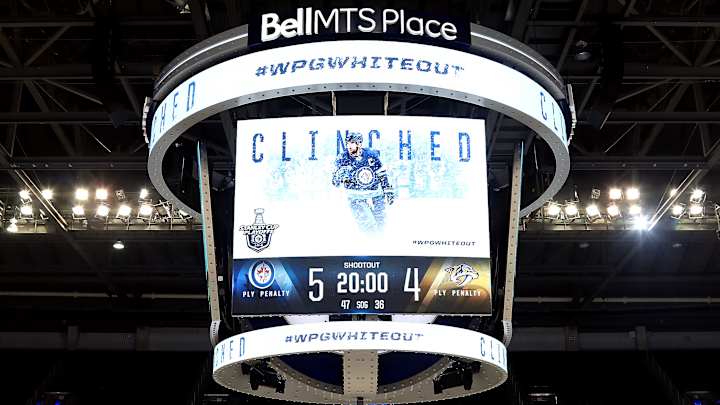NHL Playoff Format Will Knock Out Top Teams Early

Two of the top four teams in the NHL are guaranteed to be out the playoffs after the second round.
Goodbye Nashville or Winnipeg. Goodbye Boston or Tampa Bay. Thanks for playing.
That's the reality under the divisional playoff format that could pit the top two teams in the Eastern and Western Conferences against each other in round 2 after Pittsburgh and Washington were forced into that predicament in back-to-back playoffs.
''There's not a whole lot of logic there,'' Capitals defenseman Brooks Orpik said.
Alex Ovechkin Comes Up Just Short in Valiant Effort for Another 50-Goal Season
How's this for logic? If ranking teams 1 through 8 in each conference like the old format that was in place from 1993-94 through 2013, the No. 2 seed is facing the No. 4 seed, 3 versus 7, and 5 versus 6 in the first round in the East and the West this year.
A Penguins-Capitals style repeat could happen this year with the Central's Predators and Jets on a crash course for a second-round showdown and the Boston Bruins and Tampa Bay Lightning locked into a stacked Atlantic bracket with the Toronto Maple Leafs.
''You'd think that'd almost be a third-round series kind of thing, but so be it,'' Predators defenseman Ryan Ellis said. ''It is what it is. You're going to have to see a team like that eventually. There's not much you can do to change it.''
Maybe this spring will be enough to spark a change in the oft-criticized format in its fifth season that is agreed to between the league and NHL Players' Association through the 2019-20 season. The Capitals getting knocked out in the second round by the eventual Stanley Cup-champion Penguins didn't lead to much debate.
''I would assume after his year there'd be a bigger appetite to do it,'' Washington general manager Brian MacLellan said. ''In the past it hasn't affected as many teams as might be required to get that movement. It's basically been us that's been the team that's not benefited from the 1 through 8. But we'll see what happens this year with a couple more really good teams being beat out in the second round.''
Deputy Commissioner Bill Daly said the playoff format is not a burning issue for owners, wasn't discussed by GMs and should be looked at over a long period of time instead of focusing on ''anomalies.''
''It's worked I think for the most part as we anticipated it would work,'' Daly said. ''I do believe in terms of the matchups in the first two rounds of the playoffs, they're better with this format. They're just more intense and more familiar with this format than they were in the old format.''
The Legend of Z: Zdeno Chara Remains Obsessed in His Pursuit of Outsized Excellence
Reigniting and creating new rivalries was the goal of this playoff format, which mimics the one in place for most of the '80s and early '90s. Inequities have happened, but so has plenty of drama on Cup runs by the Los Angeles Kings, Chicago Blackhawks and the Penguins twice.
''I think that as a fan, you want to see matchups against rivals,'' said New Jersey defenseman Ben Lovejoy, who won the Cup with Pittsburgh in 2016. ''I think that that pits archenemies against each other more often and it can backfire every once in a while. You can get two high seeds playing each other in the first round or the second round and perhaps that's not fair but I think ultimately it's good for the game to have heated playoff series against teams that don't like each other and see each other a lot.''
Heated playoff series make this time of year fun, but Predators versus Jets and Bruins versus Lightning would be just as compelling, if not more so, in the conference finals. Hockey people reluctant to fault the system typically take an approach like Winnipeg GM Kevin Cheveldayoff, who said, ''Whether the format itself is right or wrong, if you want to win the Cup, you have to find a way to get through this format.''
The difficult part is the format isn't created equally, making one road to the third round or the Cup Final potentially easier than another.
''I don't necessarily agree with how it is, but it's the way it is,'' said winger Wayne Simmonds, whose Flyers open against the Penguins. ''You have to have a mindset that you're going to play teams in your division first and foremost and that's just the way it is.''
Orpik said players can't wait to revisit the format when the agreement is up, which could be part of the next round of collective bargaining talks. But there's no consensus on what would be better - a return to 1 through 8, league-wide 1 through 16 or something else. The expected addition of a 32nd team in Seattle could spur change, too.
''You can play a 1-to-16 playoff pool, but I would suggest to you that there'll be inequities in that,'' Predators GM David Poile said, referencing travel among the issues. ''Pick your poison. I think you change that and you come up with the next idea, you'd run into the same thing. ... I don't think there's any exact playoff plan that everybody would say is perfect.''
